#lm 5.1.17
Text
MORTUUS PATER FILIUM MORITURUM EXPECTAT
Marius dashed out of the barricade, Combeferre followed him. But he was too late. Gavroche was dead. Combeferre brought back the basket of cartridges; Marius bore the child.
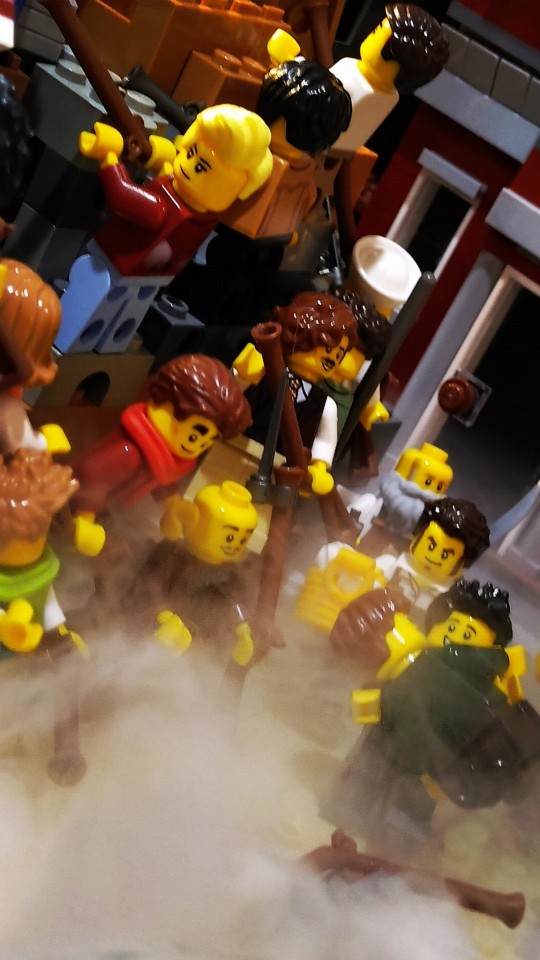
“Alas!” he thought, “that which the father had done for his father, he was requiting to the son; only, Thénardier had brought back his father alive; he was bringing back the child dead.”
When Marius re-entered the redoubt with Gavroche in his arms, his face, like the child, was inundated with blood.
At the moment when he had stooped to lift Gavroche, a bullet had grazed his head; he had not noticed it.
Courfeyrac untied his cravat and with it bandaged Marius’ brow.
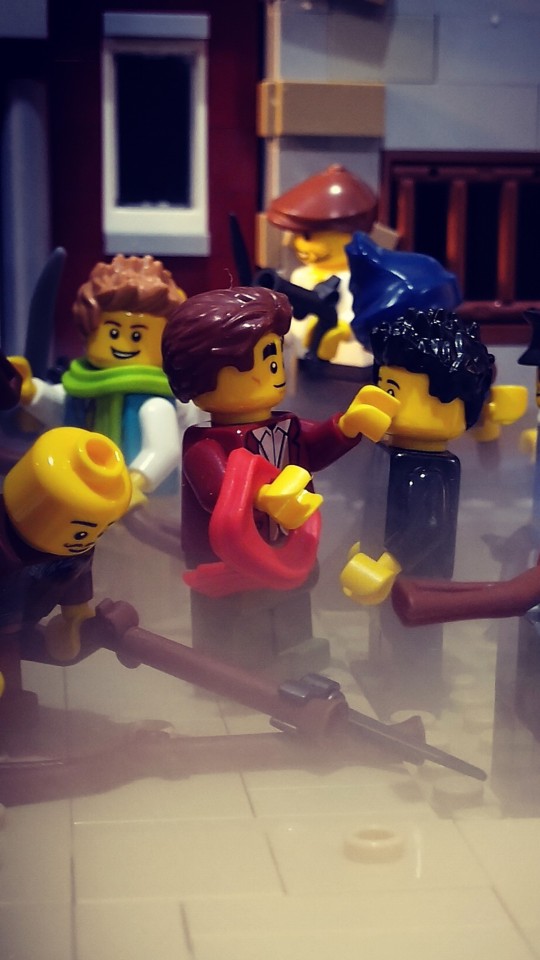
They laid Gavroche on the same table with Mabeuf, and spread over the two corpses the black shawl. There was enough of it for both the old man and the child.
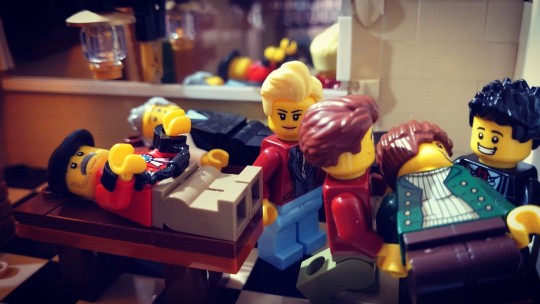
Combeferre distributed the cartridges from the basket which he had brought in.
This gave each man fifteen rounds to fire.
Jean Valjean was still in the same place, motionless on his stone post. When Combeferre offered him his fifteen cartridges, he shook his head.
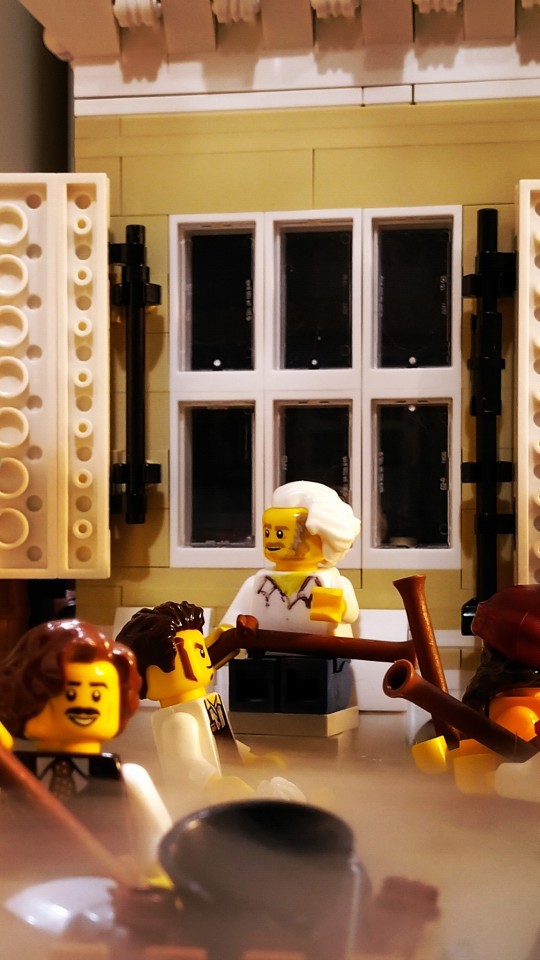
“Here’s a rare eccentric,” said Combeferre in a low voice to Enjolras. “He finds a way of not fighting in this barricade.”
“Which does not prevent him from defending it,” responded Enjolras.
“Heroism has its originals,” resumed Combeferre.
And Courfeyrac, who had overheard, added:
“He is another sort from Father Mabeuf.”
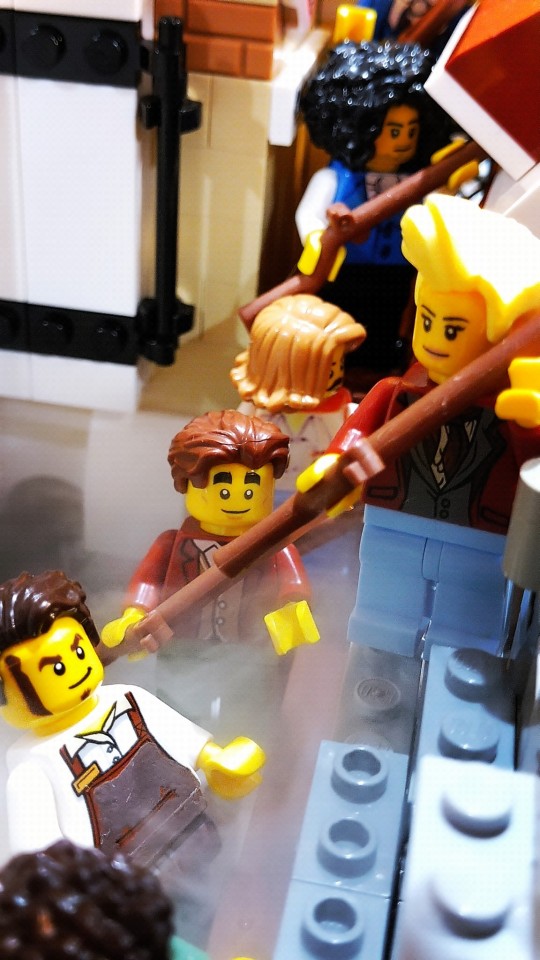
One thing which must be noted is, that the fire which was battering the barricade hardly disturbed the interior. Those who have never traversed the whirlwind of this sort of war can form no idea of the singular moments of tranquillity mingled with these convulsions. Men go and come, they talk, they jest, they lounge. Some one whom we know heard a combatant say to him in the midst of the grape-shot: “We are here as at a bachelor breakfast.” The redoubt of the Rue de la Chanvrerie, we repeat, seemed very calm within. All mutations and all phases had been, or were about to be, exhausted. The position, from critical, had become menacing, and, from menacing, was probably about to become desperate. In proportion as the situation grew gloomy, the glow of heroism empurpled the barricade more and more. Enjolras, who was grave, dominated it, in the attitude of a young Spartan sacrificing his naked sword to the sombre genius, Epidotas.
Combeferre, wearing an apron, was dressing the wounds: Bossuet and Feuilly were making cartridges with the powder-flask picked up by Gavroche on the dead corporal, and Bossuet said to Feuilly: “We are soon to take the diligence for another planet”;
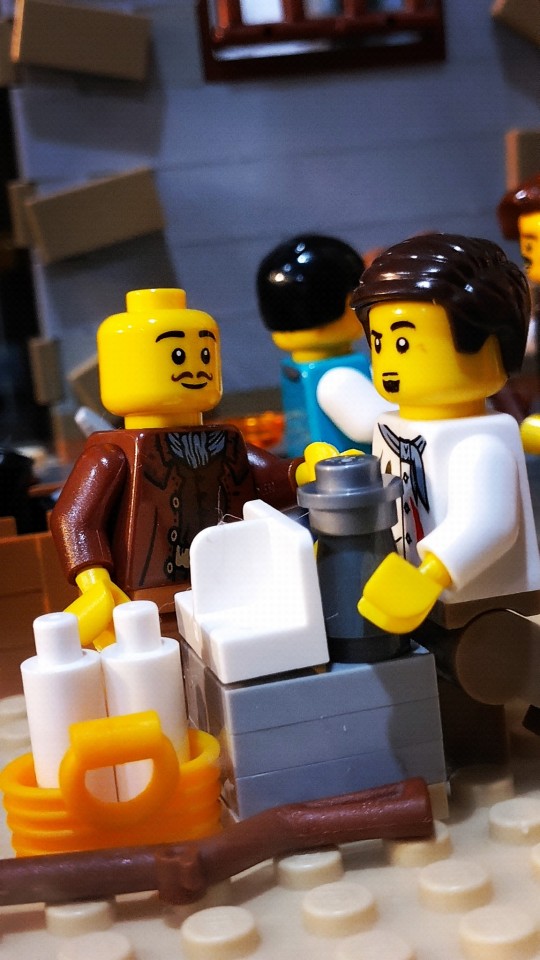
Courfeyrac was disposing and arranging on some paving-stones which he had reserved for himself near Enjolras, a complete arsenal, his sword-cane, his gun, two holster pistols, and a cudgel, with the care of a young girl setting a small dunkerque in order.
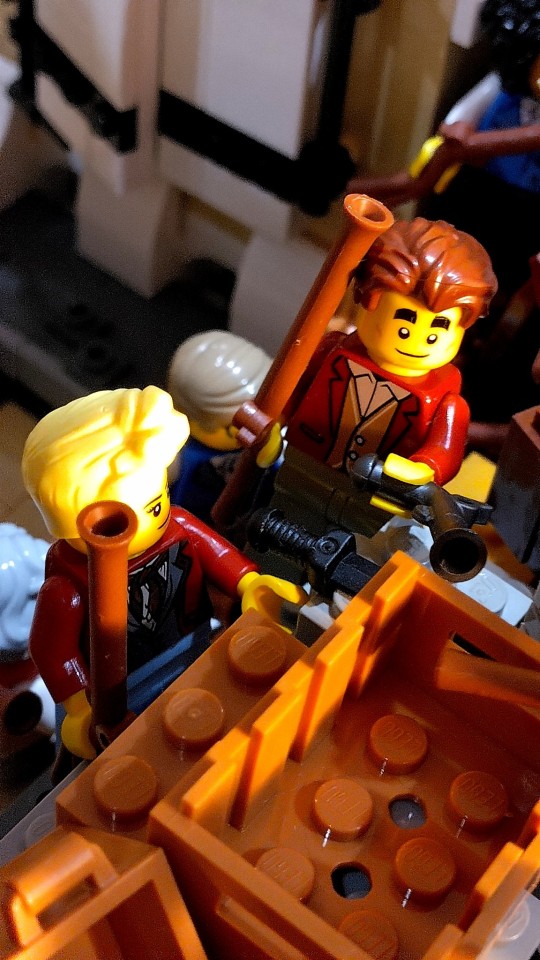
Jean Valjean stared silently at the wall opposite him. An artisan was fastening Mother Hucheloup’s big straw hat on his head with a string, “for fear of sun-stroke,” as he said. The young men from the Cougourde d’Aix were chatting merrily among themselves, as though eager to speak patois for the last time. Joly, who had taken Widow Hucheloup’s mirror from the wall, was examining his tongue in it.
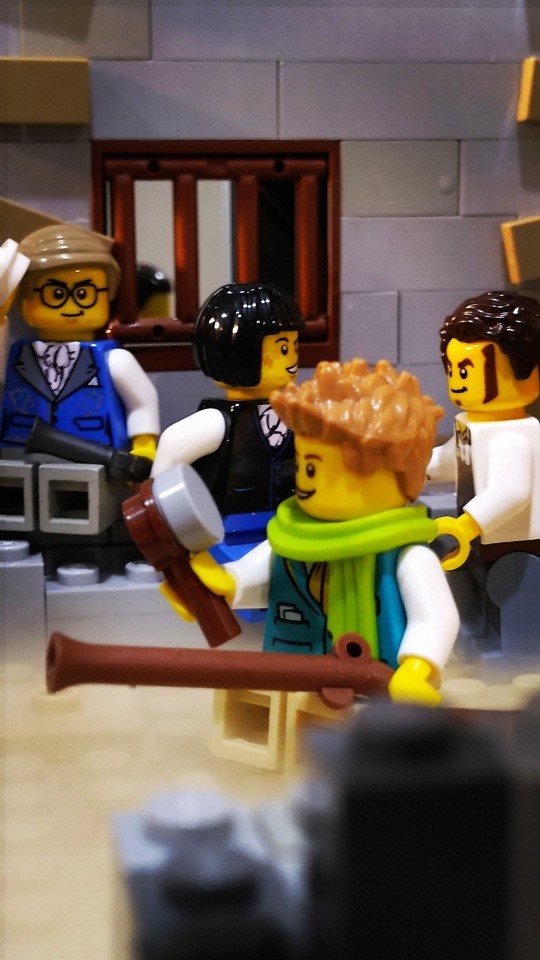
Some combatants, having discovered a few crusts of rather mouldy bread, in a drawer, were eagerly devouring them.
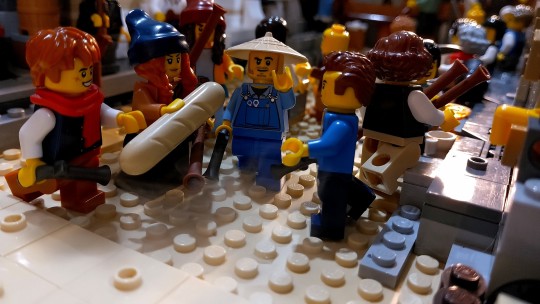
Marius was disturbed with regard to what his father was about to say to him.
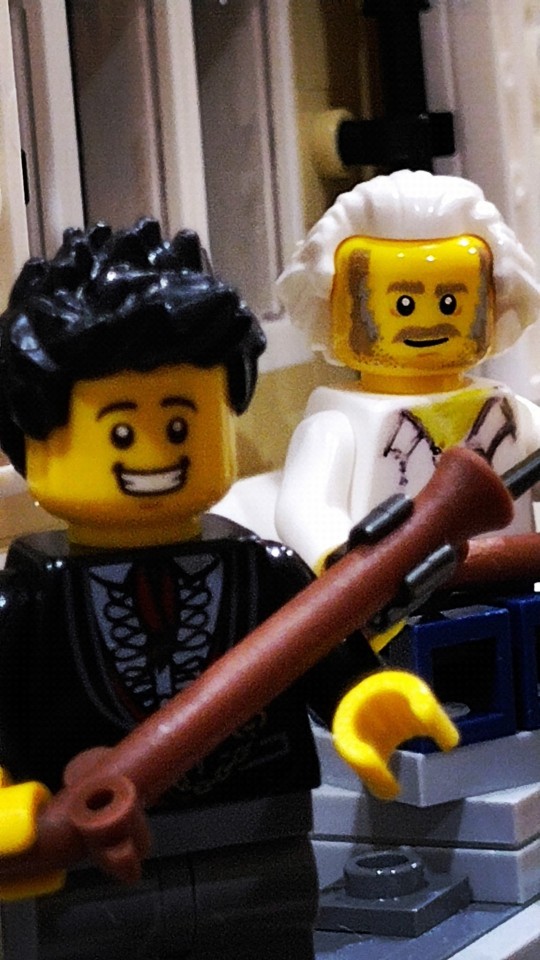
12 notes
·
View notes
Text
And we are back to the barricade – to the moment we left. Marius did not allow Gavroche’s body to be left outside the barricade. Hugo is poignant again, emphasizing that all Marius was thinking about while carrying his body was his unpaid debt to Thénardier. Gavroche’s body was at least honoured by being placed next to Mabeuf. I would remind you that Éponine’s dead body is still lying somewhere on the street, already forgotten. It’s so sad.
Ha! Combeferre gives a very fitting characteristic to Jean Valjean, calling him “a rare eccentric” and “original.” That’s who he is! And Courfeyrac adds that he is a different type of original from that of Father Mabeuf. Two old eccentrics of different types. Later, we also see how Valjean just “stared silently at the wall opposite him.” Of course. That’s his favourite pastime.
At that point, everyone is doing something useful or just something. Lovely and sad last look at those who still survived. Some are just adorable: it turned out that not only Combeferre had an entire arsenal on him, but Courfeyrac also had quite an impressive set of weaponry. Joly examining his tongue in the mirror is so… Joly! And Marius is so Marius, imagining what his father would say to him – alluding to the title of the chapter.
#les mis letters#lm 5.1.17#les miserables#gavroche#marius pontmercy#eponine#combeferre#courfeyrac#jean valjean#joly#mabeuf
52 notes
·
View notes
Text
It’s so sweet that Courfeyrac bandages Marius’ head with his cravat! And I love that Enjolras respects Valjean even if he doesn’t fight.
(I also love that Joly is checking on his health even under these conditions, although the care he and an artisan put into their health in this way serves as a reminder of the more immediate danger of gunfire to their safety).
And the barricade feels busy and alive! Everyone contributes to preparations, from a young girl to the Amis themselves. They joke around, but they work, too. The barricade is also diverse, with Hugo mentioning that some of the men speak patois (either referring to a class-based dialect, a regional one, or both; many of the Amis are from the south, and we can assume that the more working-class people of the barricades speak in slang at times).
25 notes
·
View notes
Text

#my posts#les mis#les miserables#victor hugo#lascelles wraxall#wraxall translation#lynd ward#lm 5.1.17
14 notes
·
View notes
Text
Brickclub 5.1.17 “Mortuus Pater Filium Moriturum Expectat”
@fremedon‘s analysis is right: that heroic glow that’s come over the insurgents isn’t at all what was supposed to happen. It’s better than dying pointlessly, I suppose, but we were trying to move beyond picking out singular heroes and Great Men. That was what all this was for.
...And guess who has not got that memo yet.
I’m so upset that stupid Marius makes Gavroche’s death about his own stupid debts:
"Alas!" he thought. What the father had done for his father he was returning to the son; only Thenardier had brought back his father alive, while he was bringing back the child dead.
It’s so far, far beside the point. The point is that the Guard murdered a fucking child. The point is that Gavroche is dead. The point is Not that you didn’t manage to live up to Thenardier’s sterling example of heroism and therefore still owe him something, woe-is-you. Goddammit, Marius.
(And there’s something here about what are you willing to leap into bullets and risk your life for, and who is willing to do that. Combeferre was willing to do it for the cartridges, which is fascinating. Marius was willing to do it because he thinks it’s what Thenardier did for his father (only less good), and therefore the least he could do to pay Thenardier back.)
And it’s such a cruelly, ironically bad tribute to Gavroche in particular, who, we saw when he briefly interacted with Marius, was so stratospherically far above Marius’s calculation of personal debts and personal concerns that they simply talked past each other. Gavroche was here for the republic and for liberty. He was fighting because he wanted better for his city and his world and because to hell with the authority he’d been crushed by all his life.
I think it is a pretty good lambasting of the Hero concept that one of the two heroes Marius is looking to in this chapter is fucking Thenardier. Nice one, Hugo.
Even the chapter title (“The dead father awaits the son who is also to die”) is emphasizing Marius’s weird, wrong POV. Marius still thinks this is about his relationships to individuals (and how some of those individuals are Great Men). He’s only worried what his father is going to say to him, because nothing for him ever stops being about the (extremely selectively chosen; note how Eponine never counted) individuals he thinks he was “ungrateful” to, and who he needs to spend the rest of his life paying back.
He doesn’t get it, and at this point he’s very much never going to get it, at least within the action of this book. Les Mis is long, but it’s not long enough for Marius to pick up any of its basic messages.
8 notes
·
View notes
Text
Brickclub 5.1.17, “Mortuus Pater Filium Moriturum Expectat”
Having been critical, the situation was now ominous, and from ominous was probably about to become hopeless. As their plight worsened, the barricade became ever more steeped in the crimson glow of heroism. Enjolras ruled over it gravely, in the attitude of a young Spartan dedicating his naked sword to the somber spirit Epidotes.
Epidotes--Donougher has a helpful note-- is “a purifying spirit, worshipped by the Spartans when wishing to avert divine punishment for murder.” So that’s grimly appropriate.
We’ve been talking on Discord about the frequent invocations of the heroic mode. The allusions to classical heroes have been coming more and more as the barricade’s situation has worsened, and here Hugo points that out in case we’ve missed it. We’re about to get a lot more of them, not only in the text but in chapter titles--”Orestes Fasting and Pylades Drunk,” and before that, simply, “The Heroes.”
This is wrong.
The OG FRev has appeared in mythical mode, as a past heroic age, and its few survivors, like the Conventionist, have been able to understand and wield the story’s magic system in a way their descendants can’t--except for the one rare miracle coming up--duplicate.
The original revolutionaries could be mythic heroes because they hadn’t yet run into the Empire, which spent twenty years demonstrating why heroism was no basis for a society; why any endeavor that depended on the leadership of Great Men was doomed. This has been one of the most consistent threads in the book. That the Amis, who have been striving all this time for a politics and world that can survive the loss of its great men and keep going, are being forced by necessity into being heroic is a tragedy.
There is also tragedy coming up--though mostly for Marius and the other survivors. The mode all of them should have been reaching for is the Romantic--the expansive mode that can hold great deeds and great suffering and the sublime side-by-side, without any of them dominating the narrative. But the barricade lost its Romantics, Bahorel and Prouvaire, in the first attack. That miracle coming up in OFPD is Romanticism’s last gasp here, the sublime and the grotesque literally joining hands; once it’s over, realistic domestic tragedy will be the only mode any of the survivors can access.
We’ve been joking about what a Tolkienian feeling this book has whenever it talks about the first Revolution, but honestly Tolkien and Hugo are doing a lot of the same things with narrative mode; it’s just that Tolkien is putting characters from lower modes into a story in progressively higher modes, while Hugo is shrinking the mode and the scale of his story in ways where the narrative itself seems to constrain the characters’ potential. But the effect in many places is similar--the feeling of a world that’s passed from demigods down to humans, and hobbits.
And appropriately, despite the heroic situation, despite Marius and Combeferre making their heroic dash into the bullets to retrieve Gavroche’s body and lay it out next to Mabeuf’s, everyone here is at their most hobbit-like, resisting as long as they can the narrative’s demand for a last stand. An insurgent puts on Widow Houcheloup’s sunhat. Joly studies his tongue in the mirror. Courfeyrac, “with the carefulness of a young girl putting in order a little cabinet of trinkets,” lays out all his weaponry on the paving stones just so.
Marius, the one person who is actively trying to be a hero, is worrying what his father will say to him.
5 notes
·
View notes